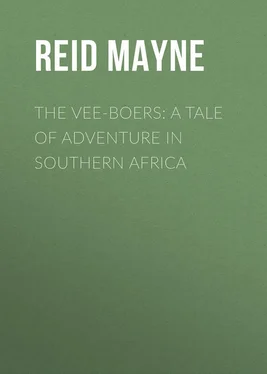Mayne Reid - The Vee-Boers - A Tale of Adventure in Southern Africa
Здесь есть возможность читать онлайн «Mayne Reid - The Vee-Boers - A Tale of Adventure in Southern Africa» — ознакомительный отрывок электронной книги совершенно бесплатно, а после прочтения отрывка купить полную версию. В некоторых случаях можно слушать аудио, скачать через торрент в формате fb2 и присутствует краткое содержание. Жанр: foreign_prose, foreign_children, на английском языке. Описание произведения, (предисловие) а так же отзывы посетителей доступны на портале библиотеки ЛибКат.
- Название:The Vee-Boers: A Tale of Adventure in Southern Africa
- Автор:
- Жанр:
- Год:неизвестен
- ISBN:нет данных
- Рейтинг книги:4 / 5. Голосов: 1
-
Избранное:Добавить в избранное
- Отзывы:
-
Ваша оценка:
- 80
- 1
- 2
- 3
- 4
- 5
The Vee-Boers: A Tale of Adventure in Southern Africa: краткое содержание, описание и аннотация
Предлагаем к чтению аннотацию, описание, краткое содержание или предисловие (зависит от того, что написал сам автор книги «The Vee-Boers: A Tale of Adventure in Southern Africa»). Если вы не нашли необходимую информацию о книге — напишите в комментариях, мы постараемся отыскать её.
The Vee-Boers: A Tale of Adventure in Southern Africa — читать онлайн ознакомительный отрывок
Ниже представлен текст книги, разбитый по страницам. Система сохранения места последней прочитанной страницы, позволяет с удобством читать онлайн бесплатно книгу «The Vee-Boers: A Tale of Adventure in Southern Africa», без необходимости каждый раз заново искать на чём Вы остановились. Поставьте закладку, и сможете в любой момент перейти на страницу, на которой закончили чтение.
Интервал:
Закладка:
Not for long were the lions chary about putting in an appearance. Soon their tawny skins were seen glistening among the trunks of the mopanes zigzagging from point to point, and at each slant drawing nigher to the spot where the waggons had drawn up.
It was now seen that there were quite twenty of them, or more; while the intonation of their cries – full of fury and menace – told of the intended attack. Had they made it on the moment, and simultaneously, it would have been all up with the travellers – at the very least would there have been wholesale destruction among their animals.
But, luckily for them, the lion does not always attack on the instant; more often making approach progressively, and with the caution of the common cat, as most others of the felidae . Probably had the prey they contemplated springing on been a party of naked natives, with no other defence than their skin shields, the leeuws 11 11 “Leeuw.” The Boers’ name for the “king of beasts.”
would have acted differently. But seeing before them that strange array – the waggons with their white tilts, a spectacle in all likelihood new to them – it was but natural they should feel shy about beginning the assault. It could not be actual fear, a feeling unknown to the African lion, in those districts where it is unaccustomed to meet the white man, with his death-dealing weapons; more like was it mystification at sight of the huge vehicles larger than elephants, and which, for all the lions knew, might be also living things, and far more dangerous.
Whether from this, or whatever cause, the great felines hesitated to make approach, though gradually drawing nigher, as the confidence became strengthened by their receiving no hurt from the singular monsters that had intruded upon their domain.
This up to a certain moment; then they were saluted by a sound louder than that they were themselves making, as the Vee-Boers poured a volley upon them, which silenced half their number, by dropping them dead in their tracks.
The rest did not retreat, but stood their ground, to all appearance more mystified than ever. They had heard thunder, and seen lightning, but never with an accompaniment of smoke, such as they now saw, wondering what it all meant. And while still unresolved, and hesitating how to act, the thick blue mist, which for a while had screened them, drifted aside, to be replaced by another and similar screen as the reloaded raw blazed forth again.
After the second volley, only two or three live lions remained upon the ground; these seeming wounded, as they went limping off among the mopanes.
For the Vee-Boers it was a victory easier than they had anticipated; and over Royalty itself – a battue of grandest game, the kings of beasts.
On gathering up the slain, they found fifteen of the leeuws , young and old, male and female, six being lions, the rest lionesses.
The reason for so many having congregated there was the drought. Up till a late period there had been wafer in the vley, making it a rendezvous for buffaloes, antelopes, and other ruminants; many skeletons of which lay around, with bones clean picked – the work of these same lions, and other carnivora. But in time instinct had directed the cud-chewing animals to repair to other places, where the water was of surer supply; while the predatory species, more able to bear thirst, and hunger too, had stayed behind. Hence such a number found crowding together; and their having been for some time without food – indeed, half-famished, as it proved on examination of their carcases – will account for their uniting to attack the travellers – an attempt so cleverly and completely foiled.
Chapter Four.
The Tulp
Meanwhile the waggons had been left standing just as they drew up, the oxen still under yoke. And now came the question, whether to “outspann” 12 12 “Outspann.” The word has a general meaning, and refers not only to detaching the animals from the vehicles, but making halt either temporarily or for the night.
, or not.
It was but of short debate, however, as all were convinced of the uselessness of remaining there. Indeed more than useless; since they would only be wasting time; and, thirsting as they were, that meant everything. Besides, their guide knew of another vley some miles farther on, where he had still better hopes of finding water – now their greatest want. The heat no longer discomforted them, as the sun had got low, and the atmosphere become as cool as they cared for. They might expect moonlight, too, as on the night before, which would also be in their favour. So, tired though they were, it was determined to trek on.
While this resolve was being arrived at, an incident occurred which was calculated to make them thankful they had not already out-spanned. Indeed, as they soon after came to know, it was rather a fortunate circumstance their finding the vley dried up. Had there been water in it, they would surely have stayed there all night, to discover next morning that their horses and oxen would not be worth taking farther – even unable to take themselves. Their milch kine would also have been sacrificed, as in reality were their sheep, to the last hoof. Luckily all but the sheep escaped, though with the driven cattle, milk cows, and their calves, it was the closest of shaves. In that grove – for it was a wood of only a few score acres in extent – there was a something even more dangerous than lions, at least to grass-eating animals. A plant it was which grew under the mopanes, green as a leek, and not unlike one in its leafage, covering the ground thickly, as onions in a garden bed. The Vee-Boers knew the plant well – too well – and, but for their attention being absorbed by the encounter with the lions, would long before have observed it. As it was, they only became aware of its presence on seeing their sheep – that had been left for a time to themselves – greedily browsing upon it. The lanigers were hungry as wolves, and would have eaten anything green that chanced in their way; so the whole flock, as soon as getting up to the wood’s edge, had rushed in among the trees, open-mouthed at what seemed a tempting morsel.
It was the baas of the travelling party – Jan Van Dorn himself – who first perceived the danger, and sounded the alarm, crying out —
“Oh, brothers! We’ve lost our sheep! See what they’re feeding on; it’s the tulp !” 13 13 “Tulp.” The Dutch name for “tulip,” of which it is but an abbreviated form. The plant itself is so called from its resemblance to the tulip, both in leaf and flower. It is of the iris family, and the genus morosa.
They thus addressed, needed no further explanation of a word which to the reader may be unintelligible. For there was not a man of them but knew what the tulp was, and its poisonous nature – possibly not one whose herds and flocks had not some time or other been decimated by it.
Soon as it was seen how things stood, there was a rush in among the mopanes, a surrounding of the sheep, and a chorus of shouts, as they were driven out again to open ground. But all too late, as every one seemed to be aware; and when at length the forward movement was about being resumed, it became a subject of discussion whether it would be worth while taking these animals along.
Still there was a hope that, however faint, some of them might survive, and leaning upon this, along were they taken; their owners making all haste to depart from a spot alike dangerous in its flora as its fauna .
Once more was there a cracking of whips, and the oxen, straightening out along the trek-touw 14 14 “Trek-touw.” The long cable-like rope of raw hide continuing the “tongue,” or pole, of the waggons, and to which the forward pairs of oxen are attached. They are also made fast to it at night, when there is any fear of their straying from the camp.
, moved reluctantly on.
Интервал:
Закладка:
Похожие книги на «The Vee-Boers: A Tale of Adventure in Southern Africa»
Представляем Вашему вниманию похожие книги на «The Vee-Boers: A Tale of Adventure in Southern Africa» списком для выбора. Мы отобрали схожую по названию и смыслу литературу в надежде предоставить читателям больше вариантов отыскать новые, интересные, ещё непрочитанные произведения.
Обсуждение, отзывы о книге «The Vee-Boers: A Tale of Adventure in Southern Africa» и просто собственные мнения читателей. Оставьте ваши комментарии, напишите, что Вы думаете о произведении, его смысле или главных героях. Укажите что конкретно понравилось, а что нет, и почему Вы так считаете.












